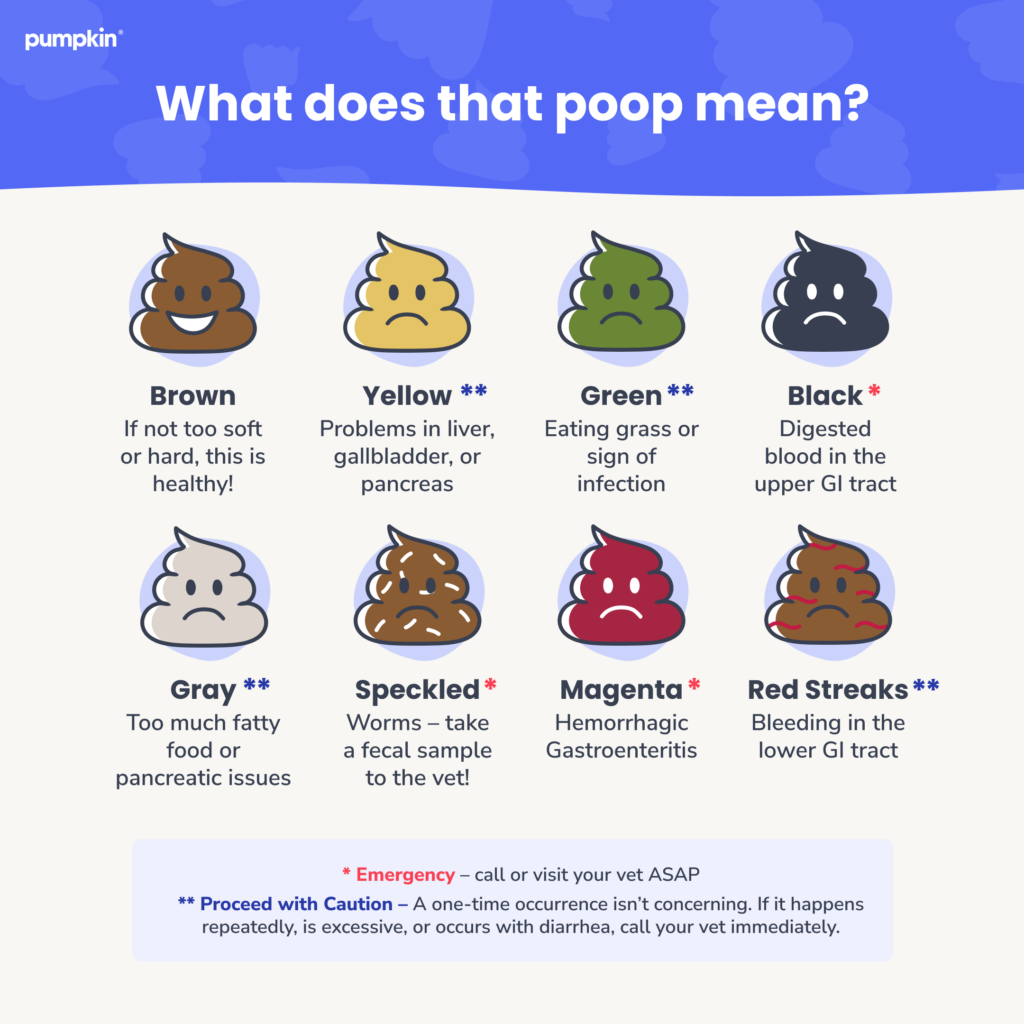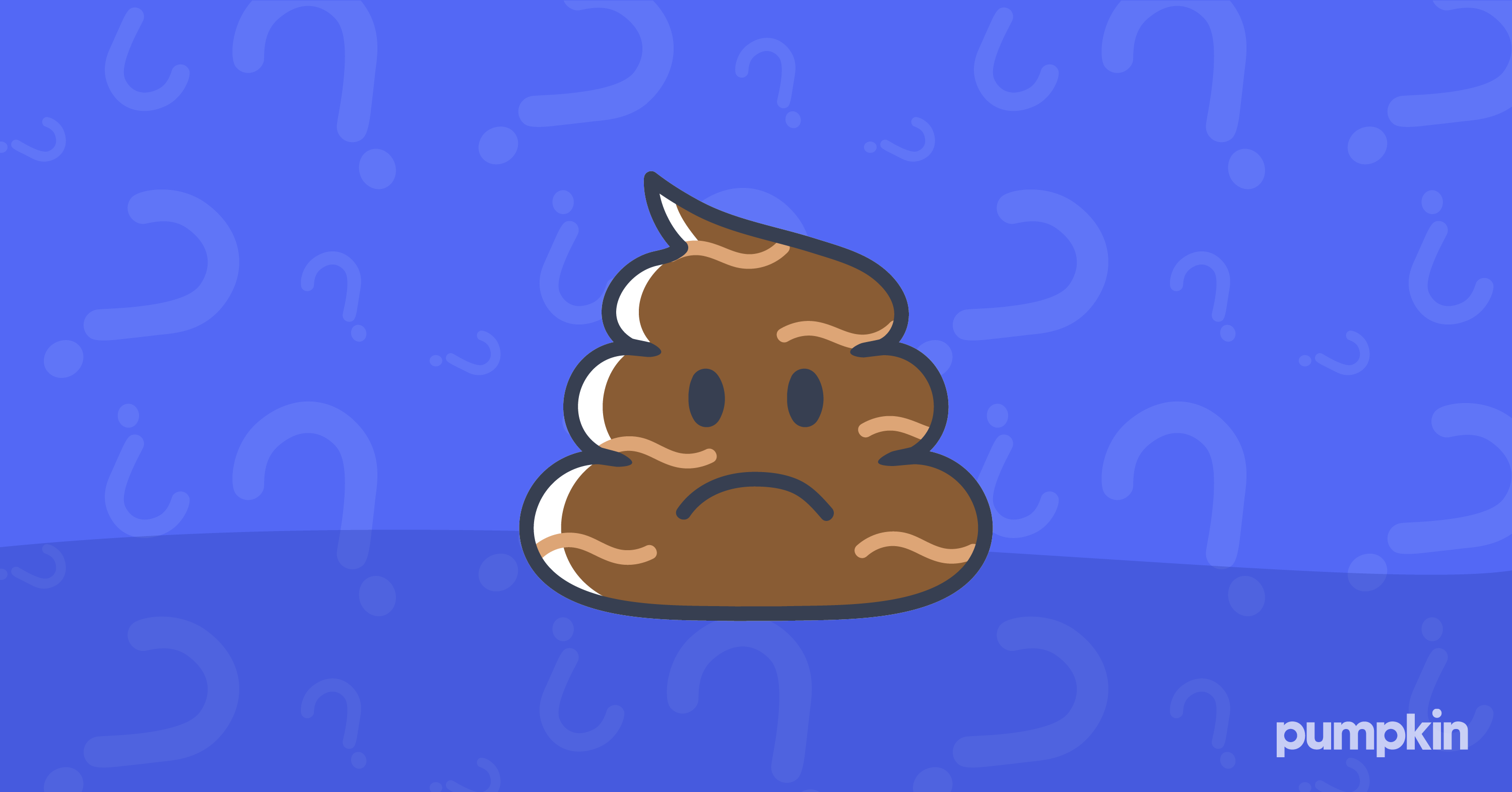Key Points
- A little mucus in dog poop can be a sign of normal indigestion, while excessive amounts might indicate something more serious, such as stress, dietary sensitivities, bacterial or parasitic infections, inflammatory bowel disease (IBD), or colitis.
- Don’t panic if you spot mucus in your dog’s stool. Monitor your pup for other symptoms and call your vet if you see anything worrisome like diarrhea, vomiting, decreased appetite, gas, bloating, or bloody or black stools.
- Follow your vet’s treatment plan — which might include a special diet, medications, or supplements — to help minimize future occurrences.
Your pup’s poop can offer clues into their health and wellness, so when you spot mucus in dog poop, it can feel a little iffy. Is this a gross but normal part of canine digestion, or a sign of something more serious?
Mucus in dog poop can mean many different things depending on volume, color, frequency, and associated symptoms. So, how do you know if the mucus you see is harmless, or if it points to a problematic health issue? That’s exactly what we asked one of our favorite veterinarians.
What does mucus in dog poop look like?
Let’s just say that you’ll know it when you see it.
Mucus in dog stool can “look like slime or snot and is usually a clear or yellow color,” says Dr. Linda Simon, veterinarian at Senior Tail Waggers.
If you spot a small amount of mucus in your dog’s poop — and if your pup is otherwise healthy and happy — you can check with your vet about administering at-home remedies such as probiotics, extra fiber, or some canned pumpkin to help resolve the issue.
However, if you see excessive mucus in your dog’s poop – or if the mucus is accompanied by bloody stools, diarrhea, bloating, or gas, then contact your vet without delay. They’ll likely want to perform basic tests like a stool analysis or bloodwork to get a better idea of your dog’s health. Depending on associated symptoms, your vet may recommend more testing, such as an abdominal X-ray or ultrasound, endoscopy, or intestinal biopsy.
What are the common causes of mucus in dog poop?
A little bit of mucus in your dog’s poop is normal — it’s just the lubrication that helps stool pass through their intestines.
However, more significant amounts of mucus in your dog’s feces can often suggest colitis, an inflammation of the colon. Signs of colitis include:
- Stool that’s semi-formed or liquid
- Smaller amounts of poop
- Straining during defecation
- A slight amount of bright red blood as your pup passes stool
“Colitis tends to flare up from time to time when dogs are exposed to specific triggers, such as foods they’re sensitive to, or shifts in routine,” says Dr. Simon.
Along with colitis, a number of causes can underlie an onset of mucus in dog poop.

Dietary changes
Your dog’s diet might be to blame for stomach upset. “Food allergies are not uncommon,” says Dr. Simon. “The most likely culprits include chicken, beef, dairy, grains, and peas.”
If you suspect your dog has food allergies, Dr. Simon suggests feeding them “a hydrolyzed protein diet exclusively for a trial of eight weeks to see if signs improve.” Unfortunately, that means no other treats or foods throughout the trial diet’s duration, so this is your opportunity to practice your resistance to puppy dog eyes. Vets often prescribe hydrolyzed dog food to treat conditions like food allergies and inflammatory bowel disease (IBD).
Remember, dogs can be sensitive to sudden diet changes. If you want to switch up your dog’s food, be sure to introduce any new food slowly. Mix in a little with your pup’s old kibble, gradually adding more over several days.
Dietary indiscretion
Sometimes, pooches gobble up things they shouldn’t, like dirt, grass, rocks, socks — or even poop. These non-food items can upset their intestinal tract and lead to mucus in their stool.
If your dog regularly consumes feces or other non-food items, be sure to talk to your vet: It could be a sign your pup is malnourished or has a condition like thyroid disease, diabetes, or parasites.
Bacterial infection
Bacterial infections in the gastrointestinal (GI) tract may also be the culprit. Along with mucus, pups that are sick from bacteria will often experience:
If you notice any of these symptoms, call your vet to book an appointment: Bacterial infections must be treated with medication.
Dogs that eat a raw meat diet are at greater risk of developing an infection from bacteria like salmonella or listeria — and their owners are at risk when they dish up the food, too. Because of the high potential for disease, many animal hospitals and kennels won’t accept dogs fed a raw diet.
To keep your pet and family safe from harmful bacteria, you may want to avoid raw meat in your dog’s food altogether.
Inflammatory bowel disease (IBD)
A bit of a misnomer, inflammatory bowel disease is a syndrome, not a disease. It’s the result of a type of allergic reaction that inflames the GI tract, causing chronic vomiting when it affects the stomach and chronic diarrhea when it impacts the intestines. This diarrhea can often be tinged with mucus.
Other signs of IBD in dogs include weight loss and poor appetite. Vets usually diagnose IBD through tissue biopsies obtained from surgery. While there’s no cure for this health condition, it can be treated with medication, diet, and vitamin supplements.
Intestinal parasites
Parasites like roundworms, hookworms, or whipworms can cause large intestinal diarrhea, which is sometimes accompanied by mucus or blood. Giardia, a microscopic parasite found in lakes, rivers, and streams contaminated with fecal matter, often causes diarrhea or loose stools as well. According to the Richard P. Riney Canine Health Center at Cornell, “watery stool with mucus and a foul odor” is one of the clinical signs of infection.
Giardia frequently infects puppies. If your puppy develops diarrhea, it’s best to take them to the vet for a checkup. Puppies can become dehydrated quickly and often need extra care to get their immune and digestive systems back on track.
Cancer
A less common cause of mucus in stool is cancer of the GI tract. If you see mucus and blood in your pup’s poop, or if the stool looks black or tarry, contact your vet, who can perform tests to look for intestinal tumors.
Stress
Stress is a common culprit behind mucus in dog poop. Some pups’ stomachs are particularly sensitive to stressful situations like a change in routine or anything that causes fear, frustration, or anxiety. And when dogs feel stressed, colitis can flare up.
“Dogs may experience bouts of colitis when in kennels or when their diet is abruptly changed,” Dr. Simon says. “Those susceptible to colitis usually benefit from a low-stress lifestyle and highly digestible diet,” she adds.
What should I do if I see mucus in my dog’s stool?
“If you see mucus in your dog’s stool, don’t panic,” Dr. Simon advises. “It’s very common.”
Still, she says it’s important to monitor your pup after spotting mucus in their stool. Look for any other clues that can help identify what’s going on, such as diarrhea, gas, bloating, or blood in the stool.
If the mucus resolves quickly and your pet is behaving normally, there’s probably nothing to worry about. However, if you see any other concerning symptoms, consider contacting your vet to schedule an appointment.
To help diagnose the cause, your DVM might:
- Request a stool sample
- Perform an exam
- Take an X-ray or abdominal ultrasound
Worrying signs that accompany mucus include weight loss, profuse diarrhea, lethargy, or a reduced appetite. If your dog is experiencing any of these symptoms, call your vet immediately.
How can I help my dog’s digestive system heal?
Your vet will likely prescribe a course of treatment tailored to the underlying cause of your dog’s digestive upset. Such treatment might consist of a special diet, medication, supplements — or all three.
Pups with chronic colitis will usually benefit from less stress and a bland diet that’s easy to digest. It’s wise to work with your vet to plan this diet, but most include:
- High-quality, highly digestible protein
- Healthy dietary fat
- Dietary fiber
- Plenty of water
“Dogs with food sensitivities may require a hypoallergenic, hydrolyzed diet,” says Dr. Simon. “And it can also help to provide a course of probiotics to ensure the gut microbiome is healthy.”
Follow your vet’s prescribed treatment plan — and support your pet’s health through quality diet and regular exercise — to minimize future occurrences of mucus.
And of course, lots of TLC goes a long way toward helping your four-legged best friend feel their best again.
Pumpkin Dog Insurance Plans come with extensive accident and illness coverage that doesn’t decline with age – providing lifelong care for pups and peace of mind for pet owners.
Mucus in dog poop FAQs
- https://www.petmd.com/dog/conditions/digestive/how-treat-mucus-stool-dogs
- https://vcahospitals.com/know-your-pet/dogs-and-raw-food-diets#:~:text=tube%2Dlike%20packages.-,Nearly%2025%25%20of%20the%20raw%20food%20samples%20tested%20positive%20for,the%20food%20while%20preparing%20it.
- https://vcahospitals.com/know-your-pet/inflammatory-bowel-disease-in-dogs
- https://vcahospitals.com/know-your-pet/intestinal-tumors#:~:text=In%20dogs%2C%20three%20types%20of,often%20in%20the%20small%20intestine.
- https://vcahospitals.com/know-your-pet/colitis-in-dogs
- https://vet.cornell.edu/departments-centers-and-institutes/riney-canine-health-center/canine-health-information/giardia-infection-treatment-and-prevention



